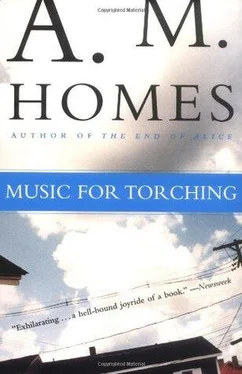"He's got asthma," Paul tells the top cop. "He can't breathe smoke."
The cops are too busy to listen. They are suiting up, putting on bulletproof vests, gas masks, riot gear.
Elaine looks out at the crowd.
Pat is there now, huddled with Joan and Catherine. "What can I do?" Pat mimes.
Elaine shakes her head-nothing. There's nothing she can do.
"This is exactly what I was saying," Paul tells the cops. "You'll scare them. You're scaring me. Right now, you and your men are frightening me. You're dealing with a nine-year-old, not some Middle Eastern mastermind. This is out of control."
"You can't guess what they're carrying," the cop says, tightening the strap of his vest.
"It's true, Gerald has all kinds of strange catalogs," Susan says.
"Remember the boy on Long Island who brought anthrax to school?"
"We have extra vests. If you want to put one on, you'll be covered if he fires out."
"He's not going to shoot us," Paul says.
Susan puts on a vest.
"This is not a movie," the secretary says, hiding behind her car.
"I don't care," Elaine says, refusing.
If Elaine were home, this would be one of those moments, time to do something different. She would step out of the house, she would stand on the steps, breathing.
A white truck pulls in. The back door opens, and men in high- tech uniforms pile out, carrying ropes and rifles.
"Is that the SWAT team?" Paul asks. As each new thing happens, the craziness compounds.
The top cop huddles with the SWAT team and the Bomb Squad, consulting the principal's diagram. "I want to close this situation down as quickly and quietly as I can." He makes his plan and then turns to Paul, Elaine, Susan-the parents. "We're going to send a little robot in. He's remote-control-operated, outfitted with a camera and a microphone so we can talk to the boys. He's unarmed. It's both an investigatory procedure and a negotiation tool."
"Does he have hands? Can he carry something?"
"Like what, a note?" the cop asks.
"Sammy's puffer," Elaine says, reaching into her purse, pulling out the spare, and handing it to the cop.
She watches them unload the robot from the back of the Bomb Squad station wagon. They set up a bank of four video monitors and walk the robot up and down the parking lot, testing the system. Before he goes in, the cop puts the puffer in the robot's claw.
One of the guys from the Bomb Squad, suited up like a scuba diver, waddles up the school steps carrying the robot in front of him as if it's a toddler.
He opens the front door and puts the robot down inside the school.
"Video up," the cop says, and four monitors fill with a robot's- eye view of cinder-block walls and bulletin boards. The picture is grainy, hard to define; the images look as though they're being transmitted from thousands of miles away, sent home from the moon.
The robot scans right and left.
"Let's go." Someone gives the signal, and the operator sends the robot forward.
"Take the first left and go down the hall," the cop whis- pers-high tension.
Elaine stares at the video feed; she fixates on the robot's claw, clutching Sammy's medicine.
In a gesture meant to be comforting, Paul reaches for Elaine's arm. He touches her-she shudders. "You frightened me," she says.
"Sorry."
Suddenly, the monitors go to what looks like a close-up of tile, a linoleum zoom.
"What happened?"
"Dunno," the operator says.
Two men from the SWAT team and the Bomb Squad guy go up the steps and into the school. A helmeted head appears on the monitors in extreme close-up. "The robot fell down," someone whispers into the microphone. "He tripped." The report booms out of the speakers, spilling across the parking lot.
The robot is set upright and is once again on his way. As the robot gets closer to the classroom, the cop starts to sing; a synthesized sound, like bad karaoke, comes out of the robot's speaker. A melange of Simon Garfunkel. "And here's to you, Mrs.."
"We want to warn the boys that R2D2's coming. It shouldn't be a surprise," one of the cops says.
"Did your kids like Star Wars ?" the operator asks.
No one answers.
The robot pushes open the door to the classroom. "Hello. Anybody home?" The camera scans. The picture is dim. The robot moves toward the cloakroom.
"Can we get a little light?" the cop asks.
The operator flicks a switch that turns on a light on the robot's head-like a coal miner's helmet or an old-fashioned super-8 movie light. The picture zooms in on Sammy and Nate in the cloakroom, Nate with the gun.
"Hi, Nate, my name is Bob. That was a great fireworks show. I love fireworks." The robot speaks in a synthesized voice. "Do you mind if I come in?" The robot rolls forward. "I brought some medicine for Sammy."
"Does your son have unusually developed arm muscles?" the cop asks, watching Nate on the video feed.
"No."
"See those bulges under his shirt?" the cop asks.
"Canisters," a Bomb Squad guy says. "And there seems to be some wiring. Would your son know how to make a bomb?"
"I have no idea."
"Would you like to talk to him?" The cop hands her the microphone.
"Nate, it's Mom. Can you hear me?"
"You sound weird," Nate says. "Like the robot."
"That's our anonymous voice of authority," the cop explains. "We use it in situations where we have multiple negotiators. It gives us universal sound, a united front, and we don't reveal anyone's identity."
"Can you make it normal?"
The operator flicks a switch.
"Nate, it's Mom. Is that better? It's enough already. It's getting late. They have to lock up the school for the night. Everyone wants to go home and watch TV. Don't you want to go home?"
"I'm not going home," Nate says. "No one is going home."
Sammy leans forward. "I want to go home." He looks into the robot. "Fix it," he says.
"He's wheezing," Elaine says. "You can hear it?"
"Nathan, Sammy is sick. He needs to take his medicine now," Susan says.
The robot's claw extends, handing Sammy the inhaler. They watch while Sammy exhales and then inhales; they can hear the dull fart of the puffer expelling its stuff.
"Thank you," the robot says. "Is there anything that you need?" The robot pauses. "It's a beautiful afternoon, why not pull the shades up?" The robot moves toward the windows.
"Get out," Nate yells. "Get out of my house."
"What's on your mind, Nate?"
Nate grabs Sammy.
He raises the gun.
He pulls the trigger. Slow motion. Video feed. Black-and-white fragments.
Sammy.
His knees go out from under, his head snaps back, like he's dodging, but it's the bullet hitting his head, pushing through skin, scalp, skull, taking out bone, hair, brain-Sammy.
The bullet-the crooked, shattering, caplet-exits, landing on the floor with a small plinking sound that no one hears.
Sammy falling.
Nate, knocked back, bangs against the wall. He waves the gun wildly.
Outside, they hear the sound of the shot in stereo, real and recorded, muffled through the walls and windows of the school and oddly amplified by the robot's microphone, a big metallic bang exploding over the speakers.
They watch it on TV.
Close-up.
Sammy.
Daniel charges the building. He goes for the side entrance. No one is moving fast enough to stop him.
The air is thick and still; there is the suspension of time, long beats of waiting. Seconds stretch.
Elaine moans, low, animal, deep.
The newscaster whispers, "One has the sense that something awful has just occurred. Shots have been fired. A little boy may have been hit. This is quickly turning into an afternoon tragedy."
Susan blows into the microphone, her voice tentative, floating over the parking lot. "Nate? Hello? Hello? Is anybody there?"
Читать дальше












